2022-2023 Physical Chemistry Division Elections
The following PHYS members have agreed to stand for election.
We are grateful for their willingness to serve the Division.
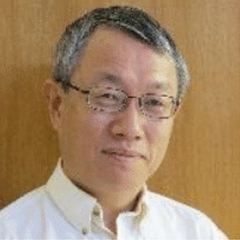
HUA GUO
(UNM)
Candidate for Vice-Chair Elect
I am thrilled about the opportunity to serve the ACS PHYSdivision as the Vice-Chair Elect. My academic journey has taken me around the world. After finishing my B.S. and M.S.degreesin China, I studied theoretical chemistry for my D.Phil. degree with the late John Murrell, FRSat University of Sussex (UK), followed by a postdoctoral stint at Northwestern University with George Schatz. I amcurrentlyaDistinguished Professor at the University of New Mexico, specializing in Theoretical and Computational Chemistry. I was elected Fellow of the American Physics Society in 2013 and Fellow of American Association for the Advancement of Sciences in 2021. My research focuses on the dynamics and kinetics of gas phase reactions, photodissociation, and reactions at the gas-surface interfaces, which found applications in atmospheric chemistry, combustion, and heterogenous catalysis. I have served as an alternate Councilorat theACSPHYS division in the past few years and am currently a Senior Editor at the Journal of Physical Chemistry. I have also organized several ACS symposia, as well as many international meetings such as the 2022 Gordon Research Conference on Molecular Interactions and Dynamics.I am also an award-winning teacher. My experience as an educator, a researcher, and an immigrant have not only given me opportunities to serve our communities, but also strengthened my conviction on diversity of thought, experience, and background. As an ACS PHYS officer, I will strive to not only maintain the highest standards in selecting our future scientific programs,in shaping the division policies for the ever-changing research and education landscape, and in attracting more members of the division, but also to promote diversity in all aspects of the ACS community.
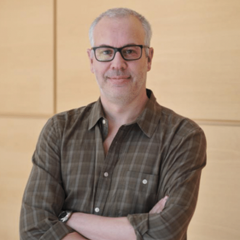
FRANCESCO PAESANI
(UCSD)
Candidate for Vice-Chair Elect
As a Professor of Chemistry and Biochemistry at the University of California, San Diego, I am working with a diverse group of postdocs, graduates, and undergraduates on the development, implementation, and application of new methods at the intersection of chemistry, physics, and computer science for molecular simulations of complex systems, from the gas to the condensed phase. As a group, we strive to integrate theoretical models, computer simulations, and experimental measurements to gain fundamental insights into molecular phenomena that could not be studied by just one of the three disciplines alone. My past service to the ACS includes serving as the chair of the ACS-PHYS Theoretical Chemistry Subdivision, co-organizing a symposium for the ACS National Meeting in Fall 2019, and serving on the Editorial advisory board of the Journal of Physical Chemistry. Beyond the ACS, I am currently serving as an associate Editor of Science Advances, I organized regional and international meetings including co-chairing the 2022 Molecular and Ionic Clusters Gordon Research Conference and the IPAMLong Program Machine Learning for Physics and the Physics of Learning in 2019, and co-founding the annual Southern California Theoretical Chemistry Symposium. My background as a first-generation student and my somewhat uncommon path to academia have strengthened even further my commitment to ensuring that diverse voices and viewpoints are consistently valued in our scientific community and, in turn, in the broader society. As an ACS-PHYS officer, I will continue to focus on promoting equal access to ACS-led activities, promoting participation of talented faculty, researchers, postdocs, graduates and undergraduates from institutions that are usually not part of mainstream initiatives.
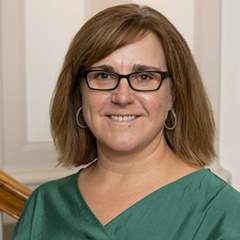
AMBER KRUMMEL
(Colorado State)
Secretary/Treasurer
Dr. Krummel is an Associate Professor of Chemistry at Colorado State University where she has developed a research program that focuses on investigating the structures and dynamics of electrolyte-dye-electrode systems. Prof. Krummel and her research group has pioneered the use of 100 kHz mid-IR laser sources in non-linear optical spectroscopy techniques including heterodyne-detected vibrational sum frequency generation spectroscopy (HD-VSFG), 2D IR spectroscopy, and 2D IR microscopy. She earned her B.S. with Honors from Portland State University (2001). She earned her Ph.D. in 2007 from the University of Wisconsin—Madison under the direction of Martin T. Zanni, where she focused on expanding the utility of coherent two-dimensional infrared (2D IR) spectroscopy for investigating nucleic acid structure and dynamics. She went on to work as a Harvard Postdoctoral Fellow in the School of Engineering and Applied Sciences under the direction of David A. Weitz; her postdoctoral research
focused on imaging two-phase flow at the pore- and multi-pore scale in three dimensions and developing coatings for microfluidic devices to enable the generation of multiple emulsions on-chip. In 2010 she joined the faculty in the Department of Chemistry at Colorado State University. Her work has been recognized with an NSF CAREER Award, as a British Petroleum ExploRe Recipient, an Alfred P. Sloan Research Fellowship, and a DOE Early Career Award. Professor Krummel has served the broader physical chemistry community by serving as a guest editor for the Journal of Chemical Physics, serving on the program committee, and now as a Program Chair for Ultrafast Phenomena. She has been a member of the ACS since 2003 and has served the ACS previously by co-chairing PHYS symposia in 2015 and 2017, and by serving as a Member-At-Large for the PHYS Division. As the PHYS Division Secretary/Treasurer, Prof. Krummel will continue the efforts by the Division to improve access and visibility all for members of the physical chemistry community.
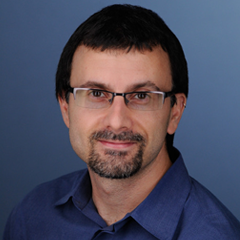
MARCO CARICATO
(Kansas)
Candidate for Member at large
As an Associate Professor at the University of Kansas, my research program focuses on the development and application of electronic structure methods for the characterization and the design of new materials with applications that range from renewable energy to biomass catalysis. My interests are in fundamental aspects of theoretical chemistry as well as in chemical problems with practical applications. My experience in the ACS includes serving as co-organizer of the monthly webinars of the PHYS division and as co-organizer of symposia in 2016, 2022, and 2023 at the National Meetings and in 2017 at the Midwest Regional Meeting. Since I started at KU, I have worked to make my group a welcoming and inclusive place and half of current and former students are part of underrepresented groups. As part of the executive committee, I will bring the same commitment to the division so that people from all back grounds may feel welcome to share their science and stimulate new research and innovation.
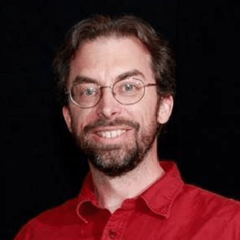
DAVID OSBORN
(Sandia/UC Davis)
Candidate for Member at large
David Osborn is a Distinguished Member of Technical Staff at the Combustion Research Facility of Sandia National Laboratories in Livermore, California, and an Adjunct Professor of Chemical Engineering at the University of California, Davis. His research program creates multiplexed methods that provide global views of chemical reaction mechanisms, with insights into kinetics, dynamics, spectroscopy, and molecular structure of reacting systems. He has applied these techniques to problems in combustion chemistry, Earth’stroposphere, and planetary atmospheres, with the goal of improving our fundamental understanding of chemical reactions and the predictive capability of chemical reaction models. David Osbornearnedhis S.B. degree in chemistry at the University of Chicago, his Ph.D. at the University of California, Berkeley, and completed post-doctoral research at JILA. He is a Fellow of the American Physical Society in the Division of Chemical Physics, was chair of the User Executive Committee and a member of the Scientific Advisory Committee for the Advanced Light Source of Lawrence Berkeley National Laboratory, and is a Senior Editor of the Journal ofPhysical Chemistry. He has organized many conferences in spectroscopy and dynamics.STATEMENT:I have been a member of the ACS since 1991, and would be honored to serve as a Member-At-Large of the PHYS Division. Mytopicalexpertise relates most closely to the Astrochemistry, Energy, and ExperimentSubdivisions. With my perspective of basic researchinbothnationallaboratoriesandinacademiaI would foster stronger links between these institutions and advocate for members from both communities.
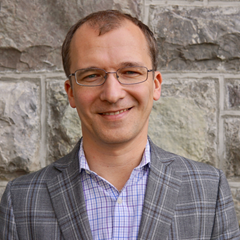
ED VALEEV
(VT)
Candidate for Member at large
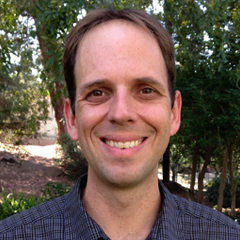
GREG BERAN
(UC Riverside)
Candidate for Councilor
My research group at the University of California Riverside develops electronic structure methods for predicting organic crystal polymorphism and solid-state NMR properties. My research combines computational method development with a focus on solving practical problems, aiming to improve the ability of our models discriminate between experimental hypotheses without incurring excessive computational costs. I have co-organized symposia on structure prediction and related topics for ACS-PHYS (Spring 2021), Pacifichem (2015 & 2021), and a joint academic-pharmaceutical industry summit(2019), and I have served as a reviewer for ACS COMP travel awards on multiple occasions. As a faculty member at an extremely diverse research university who has won major campus teaching awards and has served as the Chemistry Department Graduate Advisor for the past eight years, I have demonstrated a strong commitment to supporting the needs of our diverse and economically disadvantaged student body. I would extend that same commitment to support broad access and representation in our ACS-PHYS community. I look forward to increasing my role within the ACS and supporting on-going efforts to maintain a vibrant PHYS division.
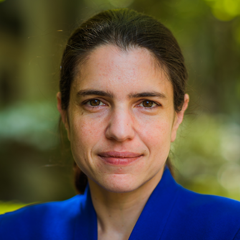
HEATHER KULIK
(MIT)
Candidate for Councilor
As an Associate Professor of Chemical Engineering and Chemistry at the Massachusetts Institute of Technology, my lab develops new algorithms and workflows in computational chemistry for areas that range from the accelerated discovery of transition metal complexes and metal-organic frameworks to the study of enzymatic catalysts. My broad interests in Physical Chemistry include basic principles of quantum mechanics and electronic structure theory as well as the application of physical concepts to catalysis and structure-property relationships. As a chemical engineer and materials scientist, my interest in Physical Chemistry are to understand how it can also be used to address practical outstanding challenges (e.g., in catalysis or materials design). My past service to the ACS includes co-organizingACS symposia for 2019 and 2021; I am also currently on the editorial advisory board at the Journal ofPhysical Chemistry. Beyond the ACS, I have organized regional and international meetings including co-vice-chairing the inaugural 2022 Computational Materials Science and EngineeringGordon ResearchConference.In all aspects of my job, I am committed to increasing the accessibility of science both in terms of participation of people from marginalized groups and in communicating science clearly to newcomers. As an ACS-PHYS officer, I will continue to work to broaden participation in science and in physical chemistry.
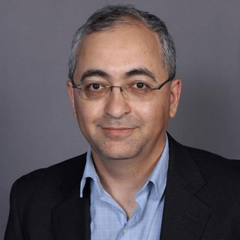
JAHAN DAWLATY
(USC)
Candidate for Alternate Councilor
Jahan Dawlaty is an experimental physical chemist at the University of Southern California. Dr. Dawlatyreceived his undergraduate degree in chemistry from Concordia College in Minnesota and his Ph.D. in physical chemistry from Cornell University, where he worked at the interface of materials and spectroscopy both in the chemistry and electrical engineering departments with John Marohn and Farhan Rana. He joined UC Berkeley for his postdoctoral work with Graham Fleming. He started his independent career at the University of Southern California in 2012. He applies spectroscopic method to fundamental molecular problems of relevance to catalysis. He has worked on measuring and modeling interfacial electric fields at electrochemical interfaces, excited state proton dynamics in molecular and material systems, and lattice dynamics in hydrogen bonded solids.He has received the NSF CAREER award, the AFOSR Young Investigator Award,the Cottrell Scholar Award, and the Journal ofPhysical Chemistry Lectureship Award among others. He has served as a guest member in the Annual Reviews of Physical Chemistryeditorial meeting, and a guest editor for the journal of Chemical Physics. He is interested in chemical education, with special emphasis on modernizing the pedagogy of chemical thermodynamics and kinetics.
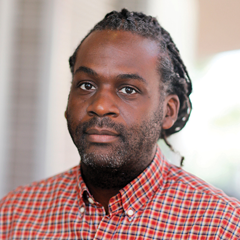
OLASENI SODE
(Cal State)
Candidate for Alternate Councilor
As an Associate Professor of Chemistry at California State University, Los Angeles, my research group develops and implements ab initio electronic and vibrational structure methods to study the quantum mechanical properties of small and large molecules, alike. My broad interests in Physical Chemistry are focused mainly in computational and theoretical chemistry. I previously served as poster judge during a Southeastern Regional ACS meeting and at multiple meetings of the Florida Annual Meeting and Exposition. Beyond the ACS, I have organized and led MolSSI-sponsored workshops on computational chemistry as a part of the annual MERCURY conference. I am deeply committed embracing diverse perspectives and as an ACS-PHYSalternateofficer, I will work to ensure that these perspectives are represented.

WEI XIONG
(UCSD)
Candidate for Alternate Councilor
As a Professor of Chemistry and Biochemistry at the University of California, San Diego, my group develops ultrafast multidimensional spectroscopy and hyperspectral imaging to resolve dynamics in complex chemical systems, including photonics systems, energy materials and biological systems. My research interests include pushing the frontier of optical techniques to gain molecular-level details in chemical problems. As an ACS Alternative Councilor, I will promote all aspects of Physical Chemistry in future National meetings and provide opportunities for emerging cutting-edge topics. My previous service to the ACS includes co-organizing ACS symposia for 2019 and 2022. Beyond the ACS, I have also organized multipleTelluride Scientific workshops, a webinar series on polariton chemistry during the pandemic, and the international conference on the strong coupling of organic molecules in 2023. As an ACS-PHYS Alternative Councilor, I will continue to provide a platform for everyone with different backgrounds in the Physical Chemistry community to thrive.
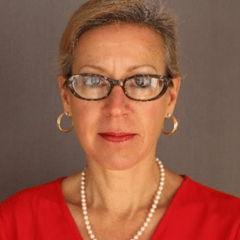
CAROLINE CHICK JARROLD
(Indiana University)
Candidate for Alternate Councilor
Dr. Jarrold is a physical chemist who uses a combination of mass spectrometry, anion photoelectron spectroscopy, and computational chemistry to study a range of open shell systems relevant in atmospheric chemistry and in modeling heterogeneous catalysis. She received a BSinChemistryat theUniversity of Michigan, Ann Arbor in1989, and a PhD in Physical Chemistry at the University of California, Berkeley in 1994 working with Prof. Daniel Neumark. After being a UC PresidentsPost-doctoral research fellow with Prof. James Heath atUniversityofCalifornia, Los Angeles, she was appointed assistant Professor of Chemistry at the Universityof Illinois, Chicago.She moved to Indiana University, Bloomington in 2002 and served as department chairfrom2018to 2022. She has co-organized two ACS symposia, and has previously served on the Advisory Board of the Journal of Physical Chemistry and on the Executive Committee for the Physical Division of the American Chemical Society. She has also served on or chaired several awards committees for the ACS Physical Division. In 2020, she was the recipient of the ACS Francis P. Garvan-John M. Olin Medal for her service to chemistry, and was also named a Herman B Wells Professor for her nearly two decades of work to advance diversity, equity, and inclusion at Indiana University.